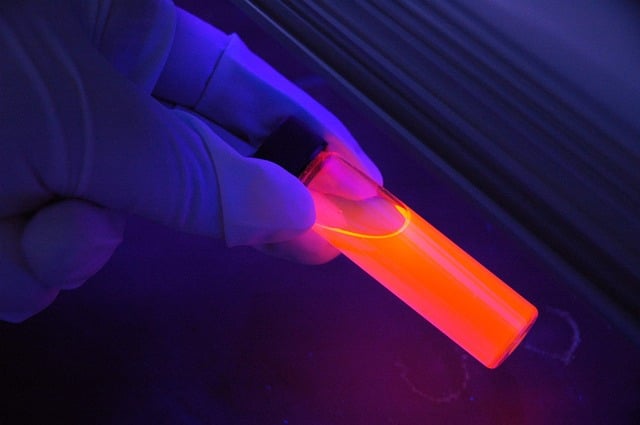Chemistry has been termed by the physicist as the messy part of physics, but that is no reason why the physicists should be permitted to make a mess of chemistry when they invade it.
Frederick Soddy
Frederick Soddy, a British chemist who won the Nobel Prize in chemistry in 1921, was one of a long line of chemists to add his two-cents-worth to the age-old friendly feud between the science of chemistry and the science of physics. While they are both branches of science that study matter, the scope of their study and their approach are markedly different. In some areas, physics (and engineering) are seen as being 'hard science', whereas chemistry (and biology) are seen as 'easy science'.
Don't get them started!
We're here about chemistry, though, so you are probably going to be firmly on the side of chemistry.
And why not? Chemistry is one of the most complex science subjects, and fascinates and enthrals many students. However, it also frustrates and confuses many students — which is where you can come in if you're thinking about offering lessons as a chemistry tutor.
In Australia, you do not need a Bachelor of Education degree or any other teaching qualification to gain work as a chemistry tutor. Of course, any teaching or education qualification is welcomed by tutoring agencies and may make it easier for you to find work, but the point is that it's not mandatory.
What is necessary is that a chemistry tutor has experience in their field, through chemistry courses, degrees or other on-the-job experience in the chemistry industry. It doesn't matter if you are still a student yourself; many university students tutor high school students in chemistry, or tutor students who are in earlier years of their chemistry major or degree.
Teachers who are currently teaching science in high school or university, or retired teachers who used to teach chemistry or other science subjects, are also popular as tutors.
And, of course, professionals who work in any of the variety of fields that involve chemical knowledge and experience, are also great tutors — especially when it comes to graduate study students who are learning in a more niche area of chemistry.

So, let's have a look at some of your options as a chemistry tutor.

Why Do People Study Chemistry?
Chemistry is a key part of the Australian Curriculum in Science, and it is mandatory that students study chemistry, along with physics and biology, from the early primary school years through to Year 10 in high school. Once students reach Year 11 and Year 12, chemistry becomes an optional study choice as students begin to focus on subjects that will get them ahead in their chosen careers or are prerequisites for entry to a university degree or TAFE diploma or certificate program.
On that note — most general university entry requirements only stipulate English at a satisfactory Year 12 level. Some also require the study of maths at the Year 12 level. However, if students are hoping to study for a degree in science, medicine, nursing, engineering or psychology (or a Bachelor of Education in chemistry teaching), it would be prudent for students to elect to study chemistry in Years 11 and 12 and to include chemistry as one of their ATAR subjects for HSC, VCE or their Australian state equivalent.
Aside from the mandatory and elective school chemistry courses, people also choose to study chemistry because they either want to enter a career in that science field or improve their promotion prospects in their current workplace. Or, they may simply be interested in chemistry and want to learn more.
When it comes to careers in chemistry, the new graduate of any sort of science degree with a major in chemistry is spoiled for choice. There is, of course, teaching (and tutoring) but as a chemistry tutor, you may be tasked to help students who want to become a:
- toxicologist
- medical laboratory scientist
- drug researcher and developer
- environmental chemist
- food and drink manufacturer
- chemical analyst
- science writer
- lawyer
- researcher
- science journalist.
People who are just interested in learning more about chemistry may be the most fun to tutor. Perhaps they want to discuss chemistry concepts or current affairs and how they relate to chemistry? Maybe they want to carry out experiments and investigations? Or perhaps they are interested in forensic science, cooking or the environment and want to learn more about the relationships between these topics and chemistry?

Whatever the reason for a student's chemistry studies, a private tutor is an ideal person to help, both online and in person.
Where Do Students Need the Most Help in Chemistry Courses?
The beauty of tutoring is that every lesson and every student is going to be different. It's also the challenge of tutoring.
Every student you have lessons with is going to need help with something different.
Chemistry course content
This would be the most common help required but, again, will be different for every student depending on the course they are doing and the level they are at. For example, is your student in a Year 7 general class, a Year 9 advanced class, Year 12 forensics class, their second year of a Bachelor of Science, an honours year or a graduate diploma of chemical science?
And, what aspects are they experiencing difficulty with? Theory? Practical application?
Study skills
If students haven't developed independent study skills by the time they reach their mid-high school years, they will continue to struggle with aspects like time management, research and revision skills. Tutors can help with this.
Exam preparation
Preparing for an exam and exam day techniques are skills that need to be taught. This includes revision skills, interpretation of questions and time management skills. Whether the student is still in high school (and preparing for their HSC or VCE ATAR exam) or is at university completing a Bachelor of Science with a chemistry major, tutoring can be targeted towards skills development in these areas over the long term or short term.
Background knowledge catch-up
It may be that your tutoring student is doing a degree in physics, biology or engineering but requires background knowledge related to chemistry. A chemistry tutor can certainly help with this.
English as a Second Language students
Students from non-English speaking backgrounds who are undertaking chemistry studies in English may not require assistance with the practical or maths components of chemistry but are likely to need to be helped with English essays, interpretation of questions and so on.

Extension
We often forget about these students, with the common perception that tutoring is for students who are struggling, but many students want to be challenged and extended in their studies. Chemistry tutors can help these students, too.
The Pros (and Cons) of Tutoring
There are many advantages to taking on part-time or full-time work as a tutor.
There are also a few disadvantages you should be prepared for — let's get them out of the way first ...
Cons of tutoring work
- Making a start
With any freelance work, getting set up and making a start can be the most difficult part. In the case of tutoring, finding students can sometimes be the biggest issue (but once you get known, fitting all the students in becomes the problem).
- Patience is key
Sometimes you may be really tired or stressed yourself, or just sick of having to answer the same questions over and over but, as a tutor, you always need to be upbeat and patient with your students.
- Balance your time
Tutoring usually happens after school or in the evenings. Making sure you have time for your own studies or work, and social life, can be tricky.
Pros of tutoring work
These benefits definitely outweigh the pitfalls of being a tutor.
- There will always be a demand for tutoring
The Australian tutoring industry has been growing for years and shows no sign of slowing. While there are students learning; there will be students needing help to learn and succeed.
- Set your own hours
Unless you are tutoring for an agency, you can set your own schedule and be as flexible as you need to be as long as you are clear and give your students ample notice of occasional changes. If you have football training on Thursday nights, block this out of your schedule.
- Set your own rates
While this can be a bit overwhelming at first, the ability to set your own fees for your tutoring services is one of the biggest benefits.
- No constraints on what or how you are teaching
As long as you are adequately planning your lessons and meeting the learning needs of your student, how you go about teaching them is up to you.
Working as a tutor is a great experience. Teaching a subject you love and seeing your students progress in their confidence and learning is simply a great feeling.
Summarise with AI:











